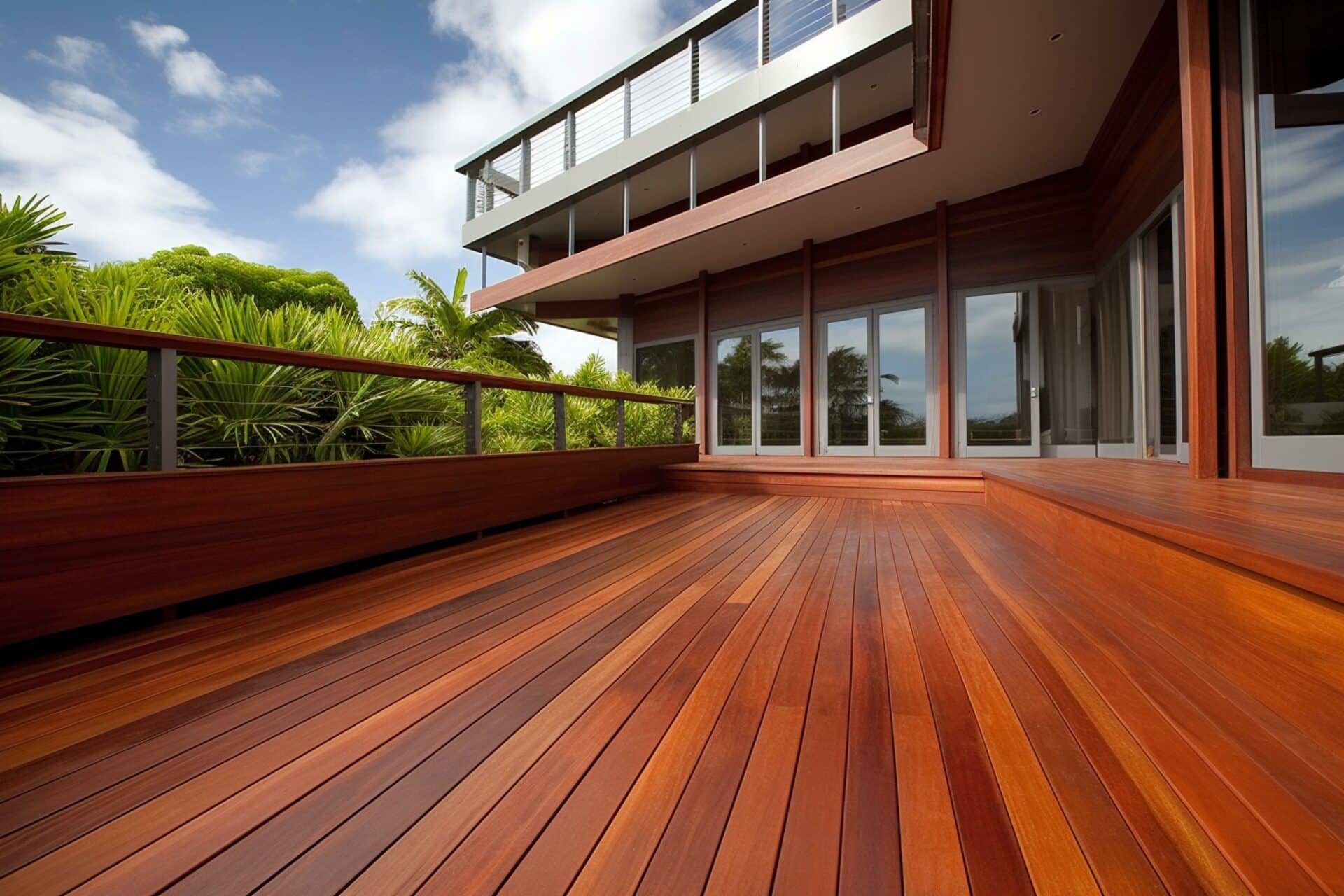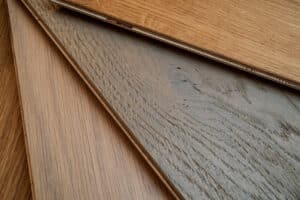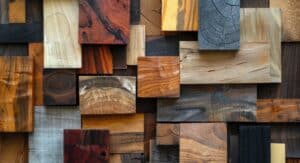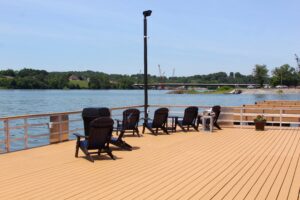Do you have a woodworking project in mind for your home but are unsure where to start? One of the first steps in any project is choosing which type of wood to use.
We recommend tropical hardwoods.
Exotic tropical hardwoods are extraordinarily beautiful, with various colors and genuine patterns. They allow you to build one-of-a-kind spaces that will leave your guests speechless.
Because these wood species grow in a very humid climate (in tropical rainforests), they have unique natural oils that make them resistant to the following:
- Different weather conditions
- Fire
- Insect damage
- Rot
- Water
What’s even better about them is that these exotic woods don’t come with costly or complicated maintenance requirements. So, if you think one of these woods would suit your next project, check out our tropical hardwoods list below to review our top choices.
1. Ipe
Ipe, also known as Brazilian Walnut, comes from the forests of South America, mainly Brazil. It’s the hardest of all the tropical woods, and its natural oils make it impenetrable to insects or other forms of deterioration.
Ipe is water- (including seawater) and weather-resistant, doesn’t scratch or splinter easily and doesn’t get hot under the sun. Because of this, many high-end luxury resorts throughout southern North America and the Caribbean use Ipe on their properties for various projects.
However, you must regularly apply oil to keep Ipe from losing its natural color. The oil also adds a layer of UV protection.
2. Tigerwood
Tigerwood, named for its unique stripes, brings drama to your space with its reddish-brown color and dark brown or black streaks. It’s an especially good choice for flooring.
But, if you use this wood for something that will experience a lot of sun exposure, the sun can fade the darker stripes, causing the wood to lose its pattern.
Native to South America and Central Africa (the African Congo, to be exact), Tigerwood has a high level of resistance to moisture.
However, because the species is on the Rainforest Relief’s list of species to be on alert for, you should only purchase this wood from an FSC-certified vendor. This guarantees the wood comes from a logging company that prioritizes forestry and practices sustainability. You also want to source tropical timber from second-growth forests, not old-growth forests. Doing so protects the environment and the wood species from deforestation.
3. Cumaru
Cumaru is another Brazilian wood with many similarities to Ipe. It ranks high for its durability, quality, and workability. Cumaru is also resistant to insect damage and mildew, doesn’t scratch or splinter easily, and doesn’t get hot under the sun.
Like Ipe, it’s a premium wood species with high-quality standards that most other woods cannot match. Yet, even with its superior status, Cumaru is affordable, making it ideal for large residential or commercial projects.
Cumaru is also a favorite choice for beach projects because it has a lifespan of over 50 years.
4. Teak
Even with massive amounts of water exposure, Teak will not rot. That’s why Teak is the go-to wood for projects near or in the sea, like shipbuilding.
Teak’s natural oils make it resistant to insects and termites, in addition to water. But really, Teak can withstand any weather condition, from severe snowstorms to torrential rains, making it an excellent choice for decks, outdoor furniture, or patios. It also can withstand UV rays from the sun.
5. Garapa
While as durable as the other tropical hardwoods on this list, Garapa has a lower Janka Hardness score, which makes it easier to use and more versatile. In fact, some contractors won’t use wood as hard as Ipe or Cumaru because their hardness can be difficult to work with.
Garapa is resistant to the following:
- Decay
- Mold
- Termites
- Water
It can also withstand extreme weather conditions, including prolonged seawater and sun exposure.
Homeowners particularly like to use Garapa for pool decks.
What Sets These Tropical Hardwoods Apart?
These tropical exotic hardwoods rise above other types of hardwood lumber because of their durability and hardness. The Janka Hardness scale tells users how hard any wood variety is; these species all top the list.
Additionally, the woods discussed here all have a high level of resistance to nuisances like insects, mildew, mold, pests, and water damage.
Yet, this is not an exhaustive list of tropical hardwoods available. Depending on your desired color and grain pattern, you can also consider other tropical wood varieties, like Cocobolo, Rosewood, Sapele, or Torem (Indonesian Redwood).
Notably, some tropical hardwoods may be susceptible to illegal logging, especially those from countries in Asia (such as Indonesia or Malaysia) or Africa. Whenever buying imported wood (wood not sourced from the U.S. or Canada), you must ensure the wood has an FSC certificate, or you risk buying from an illegal logger.
Tropical Hardwoods for Flooring
Tropical hardwoods are amazing to use for flooring because of their unique colors and patterns. More importantly, tropical hardwoods are much more durable than other types of timber, especially softwoods.
The cost to purchase and install these woods may be higher than other wood varieties, but in the end, tropical hardwoods are cost-efficient because they require minimal maintenance and have a long lifespan. You’ll never have to worry about ugly scuff marks or flooring panels falling apart from overuse.
Tropical Hardwoods for Decks
Like using tropical hardwood for flooring, tropical hardwood decking is always smart. Compared with other wood varieties, tropical hardwoods naturally resist outdoor elements and extreme weather.
Again, although their initial purchasing costs are higher, tropical hardwoods have much lower maintenance costs. This is essential for outdoor projects, which experience more wear and tear. When it comes to maintenance, you won’t have to do much besides applying oil and clearing the deck of dirt and debris.
Forget spending thousands on special treatments and cleaners. It’s unnecessary when you invest in a tropical hardwood deck.
Find the Tropical Hardwoods You Need for Your Project
If you want your project to last decades, using tropical hardwoods is your best bet. While their durability and low maintenance requirements are enough of a selling point, their color and grain pattern varieties make using them a no-brainer.
Get in touch with the team at Harbor Exports today to learn about the wood products we sell or to ask questions about your upcoming project. We have wood from all over the world, including Africa, Europe, South America, and Southeast Asia, so we’ll have the perfect product for your needs.
- About the Author
- Recent Posts
Brad Enfinger has been in construction for over 20 years and has been involved with every material from concrete slab to laying the roof on houses. Brad’s diverse experience has given him the knowledge needed to assist those with shipping building materials, whether it be a house, pole barn, deck, or a dock. Brad at Harbor Exports has anything for your building material needs and can export material all over the world.




